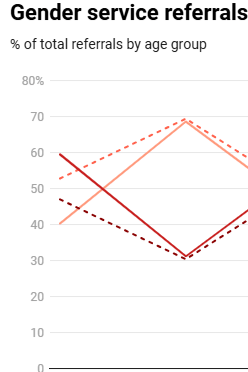INTRO
Urgent Call for Comments
The Federal Trade Commission just opened a 60-day public comment period on "gender-affirming care" for minors, and providers, researchers, and advocates are needed to respond immediately with the overwhelming evidence we have in support of this care.
It’s clear what they’re looking for—targets. They want to intimidate providers of gender-affirming care into no longer providing the only evidence-based treatment for gender dysphoria.
This is our chance to flood federal regulators with the robust research base supporting gender-affirming care—before they make decisions that could reshape how these treatments are regulated nationwide.
Every clinical study. Every outcome measure. Every life saved. The FTC needs to hear from you.
Because while hospitals abandon established science and states rush to ban treatments, young trans people are the ones who will suffer the most.
Thank you so much for being here, for supporting the care that you know is right, necessary, and defensible. Stay tuned later this month for our downloadable evidence-based fact-sheet in support of gender-affirming care, and check out the News section of this roundup for a link to the FTC request for comments.
NEWS
A Critical Moment for Gender-Affirming Care
This week brought an unprecedented development that demands immediate attention from every provider of gender-affirming care. The Federal Trade Commission has launched a public inquiry investigating potential "false claims" about gender-affirming care for minors, opening a 60-day comment period that could significantly impact how this essential healthcare is regulated and perceived.
This is a call to action. Providers, researchers, and advocates are encouraged to respond to the FTC with comprehensive evidence supporting gender-affirming care—evidence that spans nearly a century of clinical practice, thousands of peer-reviewed studies, and the lived experiences of countless individuals whose lives have been saved and transformed. The FTC's request for public comment represents both a threat and an opportunity to set the record straight about the extensive, robust evidence base supporting these treatments.
The timing of this inquiry is no coincidence, coming amid an unprecedented assault on transgender healthcare across multiple fronts.
States Fight Back Against Federal Intimidation
As the federal government escalates its campaign against gender-affirming care, blue states are mounting fierce legal resistance. A coalition of Democratic attorneys general, joined by Pennsylvania Governor Josh Shapiro, has filed a lawsuit against the Trump administration, alleging systematic intimidation of healthcare providers through threats of lawsuits and investigations.
Legal challenges do seem to be having some impact. A federal judge has ordered the Trump administration to continue Medicaid funding for all Planned Parenthood affiliates, which serve as significant providers of gender-affirming care, expanding previous funding restoration efforts. Yet the damage to access is already severe and spreading rapidly.
The Collapse Accelerates
Major healthcare systems continue to abandon transgender youth despite legal protections in blue states. Kaiser Permanente has stopped providing gender-affirming surgeries for patients under 19, while VCU Health has reversed its commitment to existing patients, ending all gender-affirming care for transgender youth under 19 over the next three months—affecting approximately 186 young patients.
In Los Angeles, where both Children's Hospital Los Angeles's Transyouth Center has closed and Kaiser has ceased youth surgeries, parents are facing impossible choices, often turning to underground networks or considering out-of-state treatment. The crisis extends to supposedly safe havens like Delaware, where Nemours Children's Hospital has stopped accepting new patients for its gender-affirming clinic despite the state's "sanctuary" status.
For those tracking these developments, Transitics' Comprehensive Anti-Trans Political Action & Litigation Map provides ongoing monitoring of transphobic laws and policies across the United States.
The assault isn't limited to the US, though. In the UK, the Equality and Human Rights Commission is planning to disregard 50% of consultation submissions regarding transphobic guidance, effectively silencing trans voices despite over 50,000 people participating in the consultation. Meanwhile, a sexual assault charity, Survivors' Network, has announced it will exclude trans and non-binary individuals from its new single-sex service.
Legislative Expansion and Community Response
The political assault continues to expand geographically. New Hampshire has enacted laws banning gender-affirming medical treatments for minors, effective January 2026, while Ohio's Supreme Court reviews the constitutionality of its own ban. As CNN's comprehensive analysis shows, 27 states have now enacted laws limiting access to gender-affirming care for transgender youth.
In response to this systematic dismantling of support systems—including the Trump administration's discontinuation of 988 crisis line support for LGBTQ+ individuals—community organizations are stepping up.
Michigan-based nonprofit Stand With Trans has launched a new hotline run by ally parents to provide support for trans youth and their families. In Chicago, where hospitals are scaling back trans care for youth due to federal funding threats, though a rapid response team has formed to connect families with independent practitioners.
Healthcare Data Privacy Concerns
Adding to these challenges, the Trump administration has announced a new private health tracking system developed with major tech companies like Google, Amazon, and Apple. While ostensibly aimed at improving access to health records, the initiative raises significant privacy concerns for marginalized communities, particularly queer and trans individuals who may be vulnerable to misuse of their health information.
The systematic nature of these attacks—from legislative bans to healthcare system abandonment to international policy shifts—represents what experts warn is an omen for broader healthcare restrictions. The tactics being used against transgender youth today could easily extend to other areas of healthcare, threatening medical freedom for all.
DIGEST
Last week at Well Beings News:
WHY UPGRADE
Paid subscribers get…
access to the research section of this Monday Roundup newsletter
original midweek reporting
interviews with scientists, researchers, health and wellness professionals, and LGBTQ+ change-makers every weekend (Professional and Lifetime)
all downloadables in the Resource Library (Professional and Lifetime)


